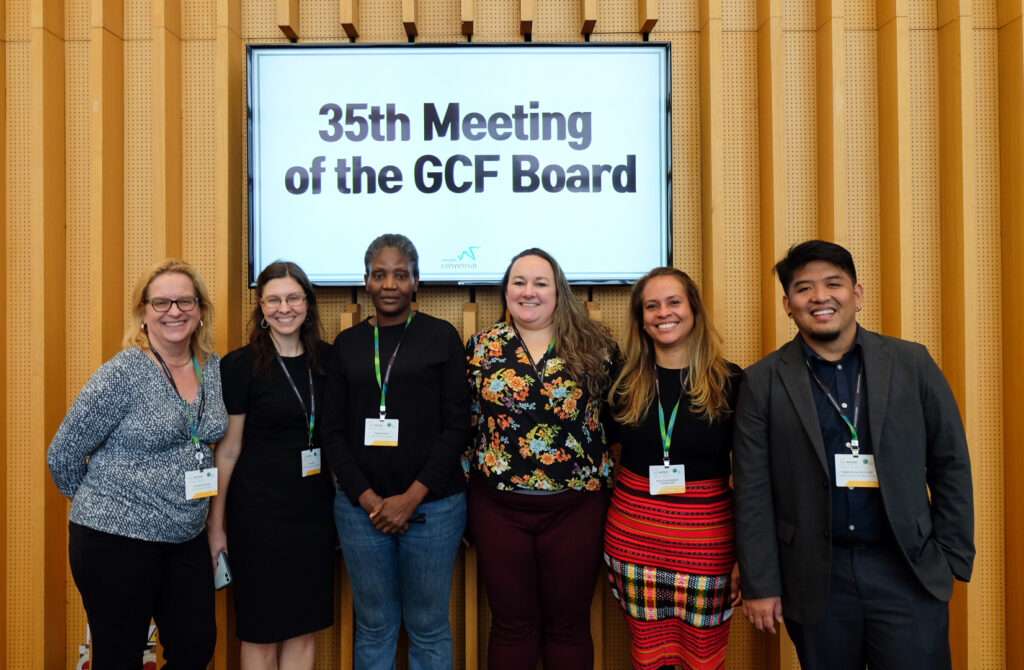In March, the board of the Green Climate Fund met in South Korea to fund climate projects and shape its strategic plan for the next four years. The Green Climate Fund was established in 2010 as a promise to channel billions of dollarsto low-income countries to help them adapt to a changing climate and reduce greenhouse gas emissions (referred to as climate adaptation and mitigation). Last month’s meeting was especially important because the GCF is in the middle of its second replenishment period,in which developed countries must recommit to paying into the Fund so that it can deliver on this promise.
CIEL and partners serve as civil society advocates in the GCFs board meetings, and were in the room where it happens last month to monitor, engage, and hold the Fund accountable. Together, we work to ensure that the Fund realizes its vision to provide necessary support to countries and communities most impacted by climate change.
The GCFs money comes fromwealthy countries with the greatest historical and present responsibility for the climate crisis,like the United States, the United Kingdom, Japan, and other countries. The Fund istasked with distributingthis money to accredited institutions (financial, government, corporate, non-profit) that then work with countries to design projects to adapt to and mitigate the impacts of climate change.
However, there are major challenges in ensuring the GCFs funds meaningfully confront the climate crisis. One concern is that the GCF has accredited all major international development banks (like the World Bank and Inter-American Development Bank), as well as several commercial banks around the world, many of which continue toprofit from financing the fossil fuel industry.In addition, projects funded by the GCF must take great care topromote human rightsto ensure they do not harm the communities they are intended to help.
When done right though,funding and projects allocated by the GCF can improve the lives of people in countries impacted disproportionately by climate change.For example,Micronesiais one of the most vulnerable Small Island Developing States (SIDS), where climate change threatens food security due to crop loss, price shocks, and forced migration of outlying communities. An ongoing project funded by the GCF is strengthening sustainable agriculture and developing climate-resilient agriculture supply chains, with the goal that Micronesia will have food sources and agricultural economies that weather the impacts of climate change by the time the project ends in 2026.
The input of civil society is critical to ensuring accountability, equity, and efficacy in GCF funding.Two elected civil society representatives (CIEL serves as one) can participate and speak directly during board meetings.These representatives collaborate via an observer network to advocate for civil societys shared priorities that are guided by communities and regional organizations most impacted by the negative effects of development and the escalating impacts of climate change.
As a designated civil society observer organization,CIEL intervenes in GCF proceedings on behalf of other organizations, Indigenous Peoples, and communities around the globe.We advocate forrobust environmental safeguards, public participation, and human rights protections. We also push forincreased transparencyinto the GCFs operations,more direct access for affected communities,and forfunding in the form of grantsrather than predatory loans that can exacerbate existing debt.

As the climate crisis intensifies,the need for climate finance will only grow as will the importance of the GCF.This international institution will continue to receive and spend a significant share of the resources channeled into financing climate adaptation and mitigation.The GCF has tremendous potential to enact transformative change, but only if its funding is distributed to sound projects that center human rights, including the rights of Indigenous Peoples.
But because the pressure to expand will be accompanied by a push for larger proposals and major private sector projects, there is a significant risk that the Fund may end up financing projects that do more harm than good. This week,the board will chart a course for the next four years, and this moment demands continued vigilanceto ensure that the GCF is backing rights-compatible projects and proven climate solutions. Namely, the GCFmustfund projects that support a rapid fossil fuel phaseout and rollout of renewable energies. The GCF mustnotfund projects that rely on problematic technologies that are unproven at scale, like carbon capture and storage and geoengineering. Nor should it fund any project used to generate carbon offsets, which fail to reduce emissions by allowing polluters to continue business as usual while claiming to be taking action on climate change, and would also risk double-funding emission reduction projects that also are being supported by polluters claiming the same offsets.
How you can help:
Support CIELs work in the GCF by making a donation. Your support helps to fund our staff research, work, travel, and advocacy before and during the GCF summit.
If you are a supporter who is part of climate-impacted communities and want to be involved in the network of organizations that work on the Green Climate Fund, email Erika Lennon at elennon@ciel.org.
Share the news and stop disinformation by re-postingsocial media content or sharing this blog to educate others about the GCF and the importance of providing equitable climate finance to those impacted the most by climate change.
We believe in the potential of the GCF to finance a better future but this is only possible if civil society, Indigenous Peoples, and impacted communities participate directly in the process.
This post was written by Erika Lennon, Senior Attorney in the Climate & Energy Program.
Published April 6th, 2023



